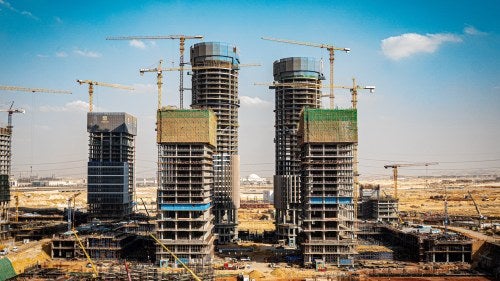Cities for Autocrats and the Future of Urban Spaces

Cities have been called bastions of democracy, but authoritarian leaders across the globe are articulating their own visions for the future of urban spaces.
In collaboration with the German Marshall Fund, the Council recently released an essay collection, “Democracy and the Life of Cities,” that offers perspectives from urbanists, policymakers, and political leaders on cities as democratic bulwarks in an era of authoritarian and populist leadership. The central themes of the collection were inspired by political theorist Benjamin Barber’s 2013 book If Mayors Ruled the World, in which he predicted that collaboration between cities might challenge “dysfunctional” nation-states on the world stage. But as recent developments remind us, cities can also be symbols of autocratic, top-down visions which stand in contrast to the pluralistic messiness of urban life. What do these visions look like?
Populist and authoritarian leaders are articulating their own visions for urban spaces. Former President Trump, Egyptian President Abdel Fattah al-Sisi, and Saudi Crown Prince Muhammad bin Salman, among others, are building or planning to build new cities from scratch. These megaprojects are unlikely to come into being, in the case of Trump’s “Freedom Cities,” or are beset by financial mismanagement, in the case of Sisi’s New Administrative Capital (NAC) and Muhammad bin Salman’s NEOM. Nevertheless, they reflect autocrats’ desire to harness and control urban dynamism.
US Freedom Cities
In March, Trump proposed a contest to design ten “Freedom Cities” located on federal land. His announcement was equal parts forward-looking and nostalgic. Describing Freedom Cities as a “quantum leap” and comparing them to Eisenhower’s interstate highway system and the first satellite launch, President Trump promised flying cars, opportunities for home ownership, and incentives for families to "launch a new baby boom.” For Trump, the cities of the future resemble the suburbs of the past. In Freedom Cities, technology would allow the economic vitality of cities to coexist with the culture and politics of rural America.
Egypt’s New Capital
Egypt began construction of the NAC in 2015, two years after General Sisi's coup d'état. The project would be inconceivable without the street protests that contributed to toppling Sisi’s two predecessors. In 2011, weeks of demonstrations in Cairo’s Tahrir Square ousted Hosni Mubarak, who had ruled since 1981, and in 2013, anti-Muhammad Morsi protests paved the way for Sisi’s ascension to power. The NAC is designed to insulate Egypt’s leaders from the pressure of Cairo’s streets. The new capital sits in the desert 28 miles east of Cairo. Billed as a “smart city,” it will be covered by 6,000 CCTV cameras and other sensors, whose data will be analyzed by AI and fed to the police in real time.
Saudi Arabia’s NEOM
MBS’s NEOM is perched between the Red Sea and the Gulf of Aqaba in northwestern Saudi Arabia. According to its website, “NEOM” combines the Greek “neo,” with an “M” for the Arabic “Mustaqbal,” meaning “future,” and for Muhammad bin Salman. The acronym reflects MBS’s ambitions for the city: a mix of east and west bearing his personal signature. Perhaps NEOM’s most bizarre, anti-urban feature is its shape: The Line is a planned 110-mile long, 660-foot wide, climate-controlled enclosure. NEOM reflects the crown prince’s desire to escape Saudi Arabia’s religious, social, and economic constraints. The city will have its own founding law, intended to attract foreign talent. Like the NAC, NEOM has already attracted controversy for its surveillance plans. The city’s technology team aims to collect from phones, heart monitors, and facial recognition cameras, among other devices.
Democracy and the Life of Cities
In their introduction to the collection, Samuel Kling, Florita Gunasekara, and Steven Bosacker argue that urban life, “dense, diverse, dynamic, and frequently chaotic, bringing together people of different identities, perspectives, and means in proximity,” can facilitate democracy. An “urban” politics, organic, cosmopolitan, and pragmatic, emerges from the spatial realities of cities and the bottom-up process in which various groups lay claim to urban space.
But as the architecture critic Blair Kamin writes in “On Density and Democracy,” “there is nothing inevitable about cities serving as bastions of democracy.” Trump, Sisi, and MBS take this to an extreme, offering a perspective on the spatial and social realities of the autocratic city. These cities are anything but urban: they are rural escape fantasies, agglomerations of palaces and parade grounds, or tightly surveilled indoor malls.
Behind the breathless descriptions of these megaprojects (NAC’s English-language website uses the word “smart” 12 times) lies an unease about the future of existing cities. Trump was a historically unappealing candidate for big-city residents, and his performance reinforces a general trend of urban-rural polarization in which cities are controlled by Democrats and rural areas by Republicans.
Sisi seeks to avoid the fate of his predecessors amidst a stagnant economy and a capital that ranks among the most polluted in the world, and MBS faces a lack of infrastructure to support Saudi Arabia’s rapidly growing, and urbanizing, youth population. By building cities from scratch, unburdened by existing urban problems, autocrats stake their claim to the future.
Like Versailles and St. Petersburg, the planned cities of the 21st century reflect the ambitions and anxieties of their builders. For now, these cities mostly exist as promotional webpages, 3D renderings, and sleepy construction sites. It seems that neither Trump, nor Sisi, nor MBS are in a hurry to realize their urban visions. When the cities of the future enter the present, they may not gleam as brightly, and their patrons will have to look for new reasons why the future belongs to them.